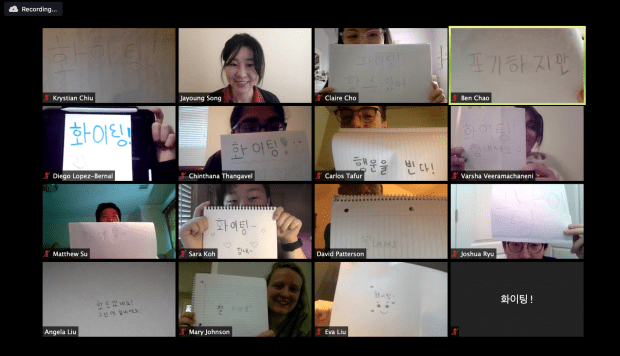Before the pandemic hit, Jayoung Song was planning to take the students in her first-year Korean language class on a series of immersive trips to some of Houston’s Korean restaurants and grocery stores. And Will Rice freshman Diego Lopez-Bernal was eagerly awaiting the first outing, because trying Korean food last year was one of the things that got him interested in learning the language in the first place.
“Once I got to Rice and I saw the Korean classes offered, I was like, ‘This is a great opportunity,’” he said. “When would I otherwise get the chance to a have really good community to practice with and excellent professors?”

Students in Jayoung Song’s first-year Korean class show notes of encouragement to their video pen pals in South Korea.
When the coronavirus prompted a universitywide pivot to online learning, Song wanted to ensure her students would still have the chance to practice their Korean language skills in an informal setting.
A month later, thanks to a video pen pal project, her class has become “big brothers” and “big sisters” to dozens of young students in South Korea — all of whom are also stuck at home to safely social distance, halfway across the world.
Song, who has won grants for her innovative teaching strategies at Rice, began contacting teachers in elementary, middle and high schools in March whom she knew from the Global Culture Network. Song knew teachers were looking for opportunities for their own students to do something creative online.
“The situation in Korea was pretty severe in January and February, so the schools hadn’t started until mid-April,” Song said. “They were still working from home and students were having an extended winter break, so they really liked this idea of doing these cultural projects together and us sending videos to their students.”

Rice students watch as a South Korean high schooler plays guitar and discusses his social distancing life.
Song’s students were split into groups, each of which made videos featuring everything from tours of their homes to tours of their dinner plates — all narrated, of course, in Korean. In exchange, South Korean students sent video responses showing off their apartments, their neighborhoods, their online school setups, their own daily lives.
“Probably the biggest appeal of this project is that it seems more ‘real’ to learners than any other projects, and it is a good way of encouraging linguistic and intercultural contact,” Song said. “Through this project, I was hoping that students use the language beyond the classroom, and more importantly, feel connected in this difficult time.”
Creating these kinds of connections has served a purpose beyond completing a language course, said Joshua Ryu, a graduate student in violin performance at Rice’s Shepherd School of Music.
“Things like this — talking to people, whether it’s over Zoom or on the phone, just staying in touch — is one of the best things we can do right now to still feel connected with everyone, with society,” Ryu said.
Back home in Edmonton, Alberta, Ryu was raised by Korean parents who spoke Korean at home — but Ryu always responded in English. Like Lopez-Bernal, he saw Rice’s Korean classes as an opportunity.
“At some point I will go to Korea, and it will be really great to be able to communicate over there, especially since most of my family is there as well,” Ryu said. “I wouldn’t want something as silly as language barrier to limit the amount of conversation I can have.”
He has plenty of practice under his belt now, between brainstorming ideas for video conversations and shooting repeated takes in order to produce a piece that Korean students can enjoy and relate to. And they are — Song said the class is receiving so many responses it’s hard to watch them all.
“Having a project that’s really engaging, especially relating to people in other parts of the world, is definitely very fun,” Lopez-Bernal said. “Seeing other students reply to our videos is pretty cool — like, they’re calling us ‘big brother’ and ‘big sister.’ It’s so cute.”
Without this semester’s trips to Korean markets and barbecues, however, there were some left over grant funds. Song made sure those went to good use too.
Two of her students volunteered to create T-shirts commemorating their new video pen pal relationships. The class voted on a design, which is now being printed on shirts that will be shipped to both Rice students across the world and their new friends in Korea — a tribute to unlikely connections forged in a world experiencing the coronavirus as one.


